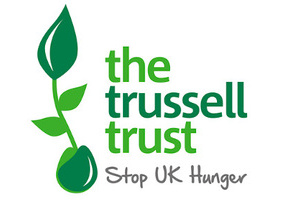Food bank charity the Trussell Trust has regretfully launched its first-ever large-scale emergency fundraising appeal to meet unprecedented demand for its services.
The charity, which supports a nationwide network of 1,300 food bank centres, said it has used up its reserve stock that would have normally lasted through winter.
It announced that it will distribute 1.3 million emergency food parcels over the next six months to help households facing financial hardship.
The money raised by the emergency appeal will fund grants and additional support to food banks to help tackle the crisis this winter as well as direct advice on personal finances.
Meanwhile, the charity recently announced that it has implemented a “wide range of initiatives” to support its staff, including a hardship fund.
Food donations have struggled to keep pace with demand
The charity experienced its busiest August and September on record, with the number of emergency food parcels distributed during these months increasing by 46% compared with last year.
For the first time in its history, food donations have struggled to keep pace with demand, meaning that food banks have already run out of food that would have been distributed this winter.
The Trussell Trust said the cost-of-living crisis has forced food banks to buy three times as much food as they did last year to meet increasing needs.
Food banks are now spending on average around £1,400 per month of their own funds to top up food donations compared with just over £750 in 2021.
‘We never wanted to run an appeal like this’
Emma Revie, chief executive of the Trussell Trust, said: “Faced with the perfect storm of rising energy prices, inflation and a potential recession that is pushing people deeper into poverty, the soaring cost of living is driving a tsunami of need to food banks.
“Through this emergency appeal we hope to raise the vital funds required to ensure that food banks can meet this devastating rise in need and continue to support people who are experiencing hardship.
“We never wanted to run an appeal like this, we would rather there was no need for food banks at all. But right now they are on the frontline of this cost of living emergency, we have no other option.”
She added: “As well as raising vital funds, we hope our emergency appeal is a stark reminder of how reliant we have become as a society on the kindness of volunteers. No one should need to turn to charity for something as essential as food and the situation we’re facing is too great for food banks to solve alone.”
Hardship fund to help staff deal with crisis
Last week, Matthew van Duyvenbode, chief strategy officer at the Trussell Trust, revealed that the trust has implemented a “wide range of initiatives”, including a hardship fund, to help staff in these challenging times.
Speaking on the first day of NPC Ignites 2022, van Duyvenbode said that poverty and food insecurity is worsening for beneficiaries, which in turn has “significant bearing on staff and volunteers’ wellbeing, fatigue and burnout”.
“We don’t know the circumstances of so many of the people who are working with and for us and we want to make sure that anybody who is in a challenging situation isn’t facing stress both at home and at work in terms of the pressures of cost-of-living”.
He told Civil Society News: “The Trussell Trust is working to support our staff team throughout the cost-of-living crisis. We have implemented a wide range of initiatives to help staff members during this challenging time including cost-of-living payments, additional advice and guidance and the introduction of a hardship fund. This fund is discretionary and specifically aimed at employees facing additional hardship during these challenging times.”
For instance, the fund could help where a partner has lost their job, a relationship breakdown, domestic and financial abuse, significant caring responsibilities, bereavement or disability/ill health compounded by the cost-of-living crisis.
He explained that applications from staff members will be considered where their circumstances “might cause them to be in significant hardship”.
“Each application will be considered on its own merits and the level of funding provided will be dependent on the staff member’s situation. While we have a variety of supports in place for all staff, the focus of this fund will be on people experiencing hardship, as opposed to a short-term cash flow problem for which other solutions might be available.”
Related articles












